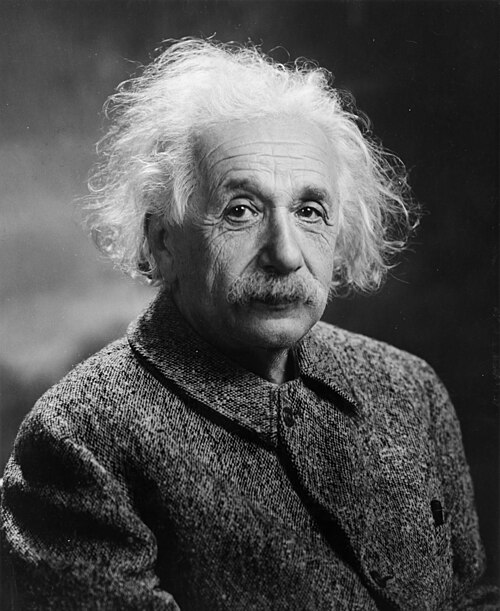
| Version | Summary | Created by | Modification | Content Size | Created at | Operation |
|---|---|---|---|---|---|---|
| 1 | Encyclopedia Editorial Office | -- | 692 | 2025-04-17 08:34:11 |
Video Upload Options
On April 18, 1955, the world lost one of its greatest intellectual giants. Albert Einstein, the Nobel Prize-winning physicist whose theories reshaped modern science, passed away in Princeton, New Jersey, at the age of 76. His death marked not only the conclusion of an extraordinary life but also a turning point in 20th-century scientific history. Though his voice was silenced, his ideas continue to resonate through the cosmos.
1. A Life Dedicated to Understanding the Universe
Born in Ulm, Germany, in 1879, Albert Einstein demonstrated a deep curiosity about the natural world from a young age. He rose to international fame in 1905 — his annus mirabilis, or “miracle year” — during which he published four groundbreaking papers that would transform physics. Among them was the theory of special relativity, introducing the famous equation E = mc² [1].

Source: By Photograph by Oren Jack Turner, Princeton, N.J. https://commons.wikimedia.org/w/index.php?curid=254353
In 1915, he presented the general theory of relativity, offering a new understanding of gravity as the warping of spacetime by mass and energy. This theory would later be confirmed by Arthur Eddington’s observations during the 1919 solar eclipse, which helped elevate Einstein to global celebrity status [2].
Einstein was awarded the Nobel Prize in Physics in 1921, not for relativity, but for his explanation of the photoelectric effect — a discovery that laid the foundation for quantum mechanics [3].
2. A Moral Voice in a Turbulent Century
Einstein was not only a scientist but also a humanitarian and outspoken thinker. As the Nazi regime rose in Germany, Einstein, a Jewish intellectual, fled Europe and found refuge in the United States. He accepted a position at the Institute for Advanced Study in Princeton, where he remained for the rest of his life [4].
Though a pacifist at heart, Einstein signed a letter to President Franklin D. Roosevelt in 1939 — co-authored with physicist Leó Szilárd — warning that Nazi Germany might be developing atomic weapons. This letter helped initiate the U.S. atomic bomb program [5]. In later years, he expressed deep regret over this decision and became an advocate for nuclear disarmament and world peace.
Einstein was also a supporter of civil rights in America. He joined the NAACP, called racism a “disease of white people,” and publicly supported the rights of Black Americans during a period when few white intellectuals would [6].
3. The Final Days
Einstein spent his later years continuing to work on a unified field theory — a hypothetical framework that could unite gravity with electromagnetism. Despite growing isolated from the mainstream physics community, he remained committed to his vision until the end.
On April 17, 1955, Einstein suffered a rupture of an abdominal aortic aneurysm. He refused surgery, stating, “I want to go when I want. It is tasteless to prolong life artificially. I have done my share; it is time to go. I will do it elegantly” [7]. Early the next morning, he passed away at Princeton Hospital.
His body was cremated that same day, but his brain was removed — without the family's full consent — for study by pathologist Dr. Thomas Stoltz Harvey. This sparked decades of scientific debate and ethical controversy [8].
4. A Legacy Beyond Time
Einstein’s death was mourned across the world. Though he was a man of science, many regarded him as a kind of philosopher — someone who embodied humanity’s search for meaning and understanding. His theories remain central to physics, from understanding black holes to navigating GPS satellites [9].
He inspired not only scientists, but artists, writers, educators, and global leaders. Time magazine named him “Person of the Century” in 1999, a testament to the breadth of his influence [10].
Perhaps most enduring is his belief in wonder. “The important thing is not to stop questioning,” he once wrote. “Curiosity has its own reason for existing” [11].
5. Conclusion: Remembering April 18, 1955
On April 18, 1955, humanity lost a man who dared to ask the biggest questions — about space, time, energy, and existence. But his ideas endure. His curiosity, courage, and creativity continue to inspire scientists, philosophers, and dreamers around the world.
Einstein didn’t just unlock the secrets of the universe — he reminded us that the act of questioning itself is a profound form of freedom.
References
- Einstein, A. (1905). Zur Elektrodynamik bewegter Körper. Annalen der Physik, 17(10), 891–921.
- Pais, A. (1982). Subtle is the Lord: The Science and the Life of Albert Einstein. Oxford University Press.
- Nobel Foundation. (1921). The Nobel Prize in Physics 1921 – Albert Einstein. https://www.nobelprize.org/prizes/physics/1921/einstein/biographical
- Highfield, R., & Carter, P. (1993). The Private Lives of Albert Einstein. London: Faber and Faber.
- Rhodes, R. (1986). The Making of the Atomic Bomb. New York: Simon & Schuster.
- Jerome, F., & Taylor, R. (2005). Einstein on Race and Racism. New Brunswick: Rutgers University Press.
- Clark, R. W. (1971). Einstein: The Life and Times. New York: World Publishing.
- Paterniti, M. (2001). Driving Mr. Albert: A Trip Across America with Einstein’s Brain. New York: Dial Press.
- Greene, B. (2004). The Fabric of the Cosmos: Space, Time, and the Texture of Reality. New York: Alfred A. Knopf.
- Time Magazine. (1999, December 31). Person of the Century: Albert Einstein. Retrieved from https://content.time.com/time/magazine/article/0,9171,993017,00.html
- Einstein, A. (1934). The World As I See It. New York: Covici Friede.




